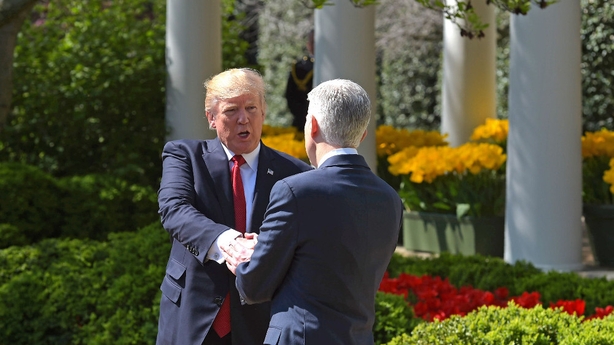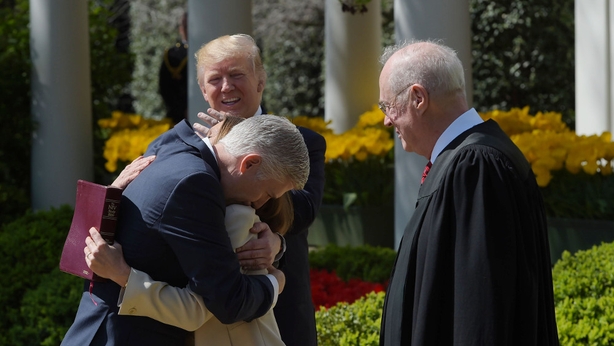Neil Gorsuch, picked by President Donald Trump and confirmed by the Republican-led Senate, has been sworn in as a US Supreme Court justice at the White House.
He fills a vacancy that lingered for nearly 14 months after the death of conservative Justice Antonin Scalia in February 2016.
The oath was administered by Justice Anthony Kennedy, for whom Judge Gorsuch worked as a clerk as a young lawyer.
He will become the first justice to serve alongside a former boss.
All the other members of the court were at the ceremony, including liberal Justice Ruth Bader Ginsburg, who called Mr Trump "a faker" last year during the presidential campaign but later said she regretted the remark.
Mr Trump at the time called on her to resign and said her "mind is shot."
Judge Scalia's widow, Maureen, also attended the ceremony.


Judge Gorsuch earlier in the day took his separate constitutional oath, administered by Chief Justice John Roberts, in a private ceremony at the Supreme Court with the other justices.
Mr Trump made Judge Gorsuch, 49, the youngest Supreme Court nominee since Republican President George HW Bush in 1991 selected Clarence Thomas, who was then 43.
Judge Gorsuch could be expected to serve for decades, and Mr Trump could make further appointments to the high court to make it even more solidly conservative, with three of the eight justices 78 or older: Judge Ginsburg, 84; fellow liberal Stephen Breyer, 78; and conservative swing vote Judge Kennedy, 80.
Judge Gorsuch will take part in the court's next round of oral arguments, starting on 17 April.
They include a closely watched religious rights case on 19 April in which a Missouri church is objecting to being frozen out of state funds for a playground project due to a state ban on providing public money to religious organisations.
He is expected to take part in oral arguments in 13 cases during the court's current term, which ends in June.
He can be expected to have have an immediate impact of the court. He takes part on Thursday in the justices' private conference to decide which cases to take up.
Appeals are pending before the justices on expanding gun rights to include carrying concealed firearms in public, state voting restrictions that critics say are aimed at reducing minority turnout, and letting Christian business owners object on religious grounds to providing gay couples certain services.
He could also play a vital role in some cases on which his new colleagues may have been split 4-4 along ideological lines and therefore did not yet decide. Those cases potentially could be reargued in the court's next term, which starts in October.
The Senate, which last year refused to consider Democratic former President Barack Obama's nomination of Merrick Garland, voted 54-45 to confirm Judge Gorsuch.

